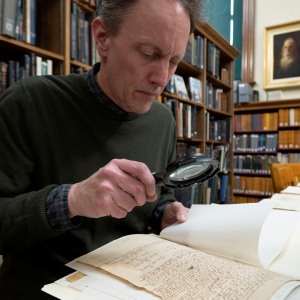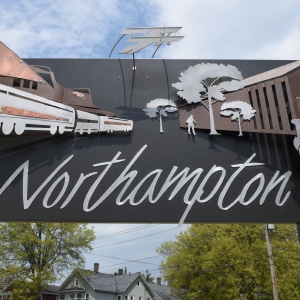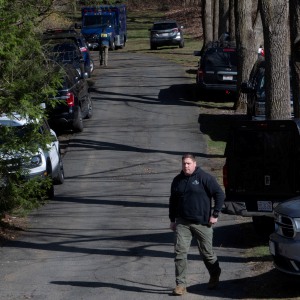Modern homesteading at NHS: Inaugural class seeks to teach students how to live self-sufficiently
|
Published: 05-13-2024 3:09 PM
Modified: 05-13-2024 4:59 PM |
NORTHAMPTON — On a scenic, warm May day, Bob Melnik leads a contingent of Northampton High School students outside the school and down a flight of stairs toward a small charcoal smoker grill to check on its contents.
Inside the smoker are nearly a dozen pieces of rainbow trout, flavored with soy sauce and maple syrup, along with ramp leeks and onions that were foraged from the nearby woods. The trout, which the students caught themselves, have nearly finished cooking, and so Melnik leads the class back up the stairs to show them how to make homemade root beer.
These activities are all part of Melnik’s homesteading class, something he began this year after teaching woodshop and engineering classes at the school since 2010.
“I basically found a way to just kind of do my hobbies in school and teach them all in a class,” Melnik said. “It’s a home economics class turned on its head.”
The purpose of the homesteading class, Melnik says, is to teach students how to live more self-sufficiently, using more naturally-grown resources and traditional manufacturing methods to make homemade versions of various goods. The class started with simple sewing, with students making their own aprons, but has since expanded to activities like fishing, cooking and now, root beer production.
“It’s whatever you can do to lessen your footprint on the earth by living a little bit more naturally,” Melnik said. “People just don’t know where their food comes from anymore, and this is able to pull the curtain back a little bit and see how this stuff is made.”
In one class, students helped the Massachusetts Division of Fisheries and Wildlife stock trout in the Mill River not far from the schools. Then they tried to catch some of the fish to prepare for food.
In another class, students made pizza using a tradition wood-fired oven.
Article continues after...
Yesterday's Most Read Articles
“I’ve done woodshop with Melnik before and if you have an idea and you come to him about it, then he’s like, ‘yeah, let’s do it,’” said Oscar Patterson, an NHS senior and a student in the class. “I felt like this class would probably be sort of like that. And it totally is. There’s times where I’ll just come in and fix a hole in some pair of pants that I have.”
For the root beer-making demonstration, Melnik shows students a method used by his parents during the Great Depression. Students poured nine cups of sugar into a bucket containing 4¾ gallons of water. The students added root bear extract and then, most crucially, a dry yeast mixture to allow for fermentation and eventually, carbonation.
“The fermentation process, not only does it create the carbonation, but it also makes dirty water clean to drink. The little microbes will quickly kill anything that’s bad in there,” Melnik explains to the class. “The first time people actually started farming, it wasn’t for food, it was for drinks, because they knew that if you fermented stuff inside water, it would kill the stuff in the water that gave people diarrhea and used to kill people. The wine was actually safer to drink than the water.”
After using a funnel to pour the root bear into bottles, Melnik then demonstrates how to properly seal a bottle cap, using an antiquated capper device, that uses a handheld lever to press down and apply pressure to the cap.
Donovan Cruz, a senior and one of the students manning the capping machine, said this was the fourth class with Melnik throughout high school.
“I’m kind of a veteran of this class,” Cruz said. “Making things is always what I wanted to do, and now I get to do it all of the time.”
Melnik said that he hopes to continue the class next year, using this year’s experience as a springboard for introducing other topics as part of the curriculum for future students.
“I’ll have more handouts, quizzes, and tests next year when I actually have done it the first time [since] I don’t even know exactly what’s going to work,” he said. “The good news is, no matter what I’m doing, most of the kids haven’t done it before. Everything’s a learning experience if you’ve never done it before.”
Alexander MacDougall can be reached at amacdougall@gazettenet.com.
















 Trump’s order to target federal funding vexing to libraries, museums throughout region
Trump’s order to target federal funding vexing to libraries, museums throughout region Area briefs: Haydenville church Easter Soup & Bake Sale; Frontier Community Access editing drop in hours; Northampton Democratic City Committee to caucus; Traffic advisory for DAR State Forest
Area briefs: Haydenville church Easter Soup & Bake Sale; Frontier Community Access editing drop in hours; Northampton Democratic City Committee to caucus; Traffic advisory for DAR State Forest Hadley man detained after chemicals go missing
Hadley man detained after chemicals go missing Community printing hub takes shape in Easthampton
Community printing hub takes shape in Easthampton
